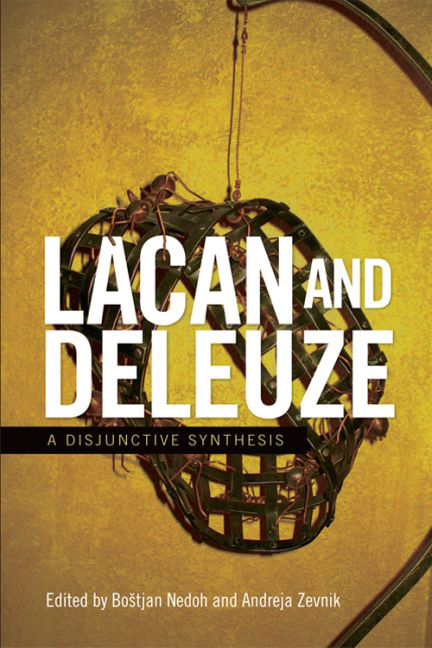Book contents
- Frontmatter
- Contents
- Acknowledgements
- Introduction: On a Disjunctive Synthesis between Lacan and Deleuze
- 1 For Another Lacan-Deleuze Encounter
- 2 Reciprocal Portrait of Jacques Lacan in Gilles Deleuze
- 3 Does the Body without Organs Have Any Sex at All? Lacan and Deleuze on Perversion and Sexual Difference
- 4 Gnomonology: Deleuze's Phobias and the Line of Flight between Speech and the Body
- 5 Lacan, Deleuze and the Politics of the Face
- 6 Denkwunderkeiten: On Deleuze, Schreber and Freud
- 7 Snark, Jabberwock, Poord'jeli: Deleuze and the Lacanian School on the Names-of-the-Father
- 8 Baroque Structuralism: Deleuze, Lacan and the Critique of Linguistics
- 9 Exalted Obscenity and the Lawyer of God: Lacan, Deleuze and the Baroque
- 10 The Death Drive
- 11 Repetition and Difference: Žižek, Deleuze and Lacanian Drives
- 12 Lacan, Deleuze and the Consequences of Formalism
- Notes on Contributors
- Index
Introduction: On a Disjunctive Synthesis between Lacan and Deleuze
Published online by Cambridge University Press: 20 April 2017
- Frontmatter
- Contents
- Acknowledgements
- Introduction: On a Disjunctive Synthesis between Lacan and Deleuze
- 1 For Another Lacan-Deleuze Encounter
- 2 Reciprocal Portrait of Jacques Lacan in Gilles Deleuze
- 3 Does the Body without Organs Have Any Sex at All? Lacan and Deleuze on Perversion and Sexual Difference
- 4 Gnomonology: Deleuze's Phobias and the Line of Flight between Speech and the Body
- 5 Lacan, Deleuze and the Politics of the Face
- 6 Denkwunderkeiten: On Deleuze, Schreber and Freud
- 7 Snark, Jabberwock, Poord'jeli: Deleuze and the Lacanian School on the Names-of-the-Father
- 8 Baroque Structuralism: Deleuze, Lacan and the Critique of Linguistics
- 9 Exalted Obscenity and the Lawyer of God: Lacan, Deleuze and the Baroque
- 10 The Death Drive
- 11 Repetition and Difference: Žižek, Deleuze and Lacanian Drives
- 12 Lacan, Deleuze and the Consequences of Formalism
- Notes on Contributors
- Index
Summary
In the history of the late twentieth-century continental philosophy an intellectual controversy between Gilles Deleuze and Jacques Lacan is one that is perhaps known best. It is often said that Lacan is the most radical representative of structuralism, a thinker of negativity and alienation, of lack and subjective destitution. Deleuze, in contrast, is pictured as a great opponent and critic of the structuralist project in general and of Lacanian psychoanalysis in particular, as one of the key twentieth-century thinkers of vitalism and a philosopher of positivity, creative potentialities of desire and production. Nowadays it seems impossible not to choose sides: to either opt for Deleuze (against Lacan) or for Lacan (against Deleuze). Structuralism and negativity versus vitalism and positivity, the lack of the subject versus the fold of subjectivation. Lacan and Deleuze, it seems, cannot be further apart. Yet, this common opinion is in many ways misleading, made in the absence of any serious intellectual engagement with the two thinkers, and one which overemphasises their biographical anecdotes (associated notably with the quarrel surrounding the publication of Deleuze and Guattari's Anti-Oedipus in 1972), of which, no doubt, there were many.
The past two decades have seen a number of attempts that aimed at creating a productive dialogue between the works of Deleuze and Lacan; yet most of these attempts fall short in reaching their goal as they at least implicitly buy into the previously established two-sided opposition with Lacanians and psychoanalysis on the one end and Deleuzians and schizoanalysis on the other end. In other words, contemporary debates addressing the difference between the two authors are largely still structured around the most irreconcilable moments, such as the negativity of castration compared with the positivity of desire.
Precisely these prejudices which often hinder if not stop short the debate about and between Deleuze and Lacan can overshadow what is interesting in this irreconcilable dialogue between the two. When the aforementioned personal quarrels are put aside, there are different ways in which one might wish to approach this conversation. A path that emerged on the back of the different chapters in this book investigates their relationship to structuralism. While they maintained their differences, Lacan and Deleuze also share a very similar position in relation to the structuralist project in a period prior to the events of 1968 in France.
- Type
- Chapter
- Information
- Lacan and DeleuzeA Disjunctive Synthesis, pp. 1 - 12Publisher: Edinburgh University PressPrint publication year: 2017



